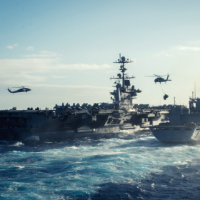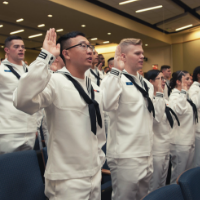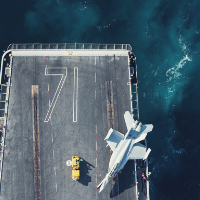China and Indo-Pacific Security Affairs
The China and Indo-Pacific Security Affairs (CIP) division is the largest non-governmental research group studying Chinese and Indo-Pacific military and security affairs in Washington. More than 40 CIP analysts cover the coastal nations from South Asia to Northeast Asia, including Oceania, and are fluent in Mandarin, Japanese, Russian and Hindi. CNA’s China Studies program has provided the government with great power competition research on China for more than 20 years.
Center for Autonomy and Artificial Intelligence
The Center for Autonomy and Artificial Intelligence promotes the effective incorporation of autonomy, artificial intelligence and related technologies in military operations. The center’s work is guided by four objectives: Connect key stakeholders, conduct multi-disciplinary research, provide useful recommendations for advancing the effectiveness of U.S. military operations, and develop and refine creative approaches to the development and use of autonomy and AI.
The Operational Warfighting (OPS) division focuses on improving the ability of the Department of the Navy to organize, plan, train and execute at the operational level of warfare. OPS analysis typically links wargaming, concept development, hypothesis testing, and exercise and operational assessment into an iterative cycle. The division’s research emphasizes naval integration, joint and combined operations, cyber effects, intelligence support and special operations.
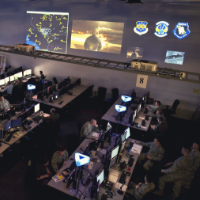
Cyber Research Program
Grounded in a deep understanding of military operations, the Cyber Research Program provides objective analysis to military leaders charged with a wide range of cyber related responsibilities. CNA analysts address issues in cyberspace operations; cybersecurity principles and implementation; strategy, policy, deterrence and escalation; cyber workforce management and manpower needs; cyber acquisition; and resource and gap analysis.
The Resources and Force Readiness (RFR) division provides analysis that helps the Navy, Marine Corps, and other services address critical resource allocation challenges and maximize personnel readiness. Military leaders rely on Resources and Force Readiness analysis to develop, evaluate and implement policies and programs that make their people, budgets and assets more effective and efficient.
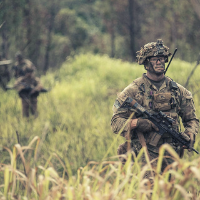
Special Operations Research Program
The Special Ops program examines the most complex and challenging issues facing special operations forces both today and for the future. The program maintains key competencies in areas including special operations exercises and training; workforce management and preservation of the force; regional security analysis; acquisition, resource and cost analysis; infrastructure and support activities.
Systems, Tactics, and Force Development
The Systems, Tactics, and Force Development (STFD) division provides classical warfare analyses to the Navy and DOD focused on systems and platforms at the tactical level for great power competition. STFD conducts quantitative analyses of fleet systems and multi-mission platforms to develop performance estimates against China, Russia and other threats. The division analyzes and assesses combinations of networks, sensors, weapons, and platforms to provide maritime warfighting capabilities in all warfare areas, under realistic conditions for current operations and future-force architectures.
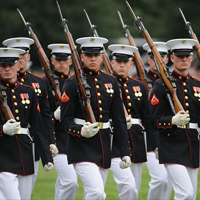
The Marine Corps Program oversees and manages all aspects of CNA’s support to the Marine Corps. The program provides analytic support on a wide range of issues critical to the Marine Corps leadership—this work is executed within the FFRDC research divisions. In addition to CNA headquarters-based analysts, CNA analysts provide full-time on-site support to key Marine Corps operating force commands as part of our field program. The Marine Corps program also includes analytic support to major exercises and on-site deployed support for all major real-world operations and contingencies involving Marine Corps forces.
Strategy, Policy, Plans, and Programs
The Strategy, Policy, Plans, and Programs (SP3) division leverages social science methodologies, field research, regional expertise, primary language skills, Track 1.5 partnerships, and policy and operational experience to support senior decision-makers. The division’s work is aligned with the National Defense Strategy and has regularly informed decisions critical to national security.
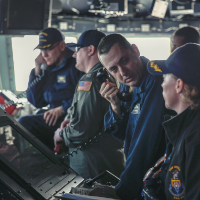
The Operations Evaluation Group (OEG) oversees all aspects of CNA’s field program and exercise support program. The field program is unique among independent military research organizations, deploying analysts in long-term capacities to operational commands around the world to provide full-time, on-site support to commanders and their staffs on a wide range of strategic, operational and tactical issues. CNA supports nearly every major naval exercise, gathering data on site and developing reconstructions and analyses.

Data Science
The Data Science Division develops advanced analytics and algorithms, including machine learning and predictive analytics, to optimize outcomes for the Department of the Navy. The program focuses on efforts where the size of the datasets and complexity of the questions demand advanced coding skills for data wrangling and statistical and modeling techniques. The DSD also supports decision-makers with design thinking facilitated workshops, a solution focused methodology, and dynamic, quick-turn efforts.





